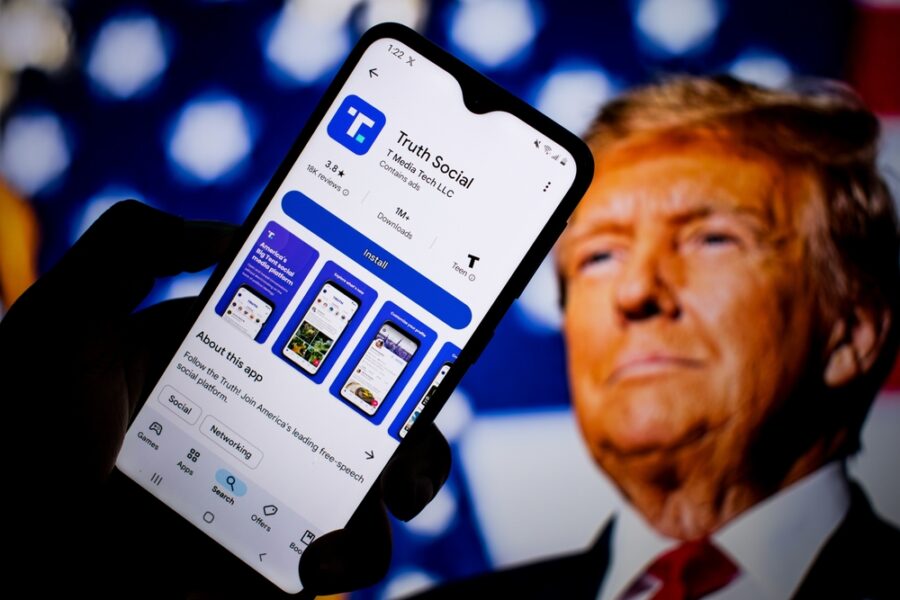Trump Media partners with Crypto.com to offer prediction market

US President Donald Trump’s social media firm, Trump Media & Technology Group, has partnered with crypto exchange and trading platform Crypto.com to launch a prediction market on Truth Social.
Truth Predict will enable Truth Social users to trade on the outcomes of future events, including elections, inflation rates, and sports outcomes.
Integration testing is planned to begin soon, the firm announced on Tuesday, followed by a full US rollout and then global expansion “once all the requisite requirements are met”.
Chief Executive of Trump Media and former Republican Representative, Devin Nunes, said, “For too long, global elites have closely controlled these markets – with Truth Predict, we’re democratizing information and empowering everyday Americans to harness the wisdom of the crowd, turning free speech into actionable foresight.”
Truth Predict will use the Commodity Futures Trading Commission-registered exchange Crypto.com Derivatives North America to facilitate prediction contracts in an exclusive arrangement.
In August, the companies agreed to form a crypto treasury vehicle to manage Crypto.com’s native cryptocurrency, the CRO token.
According to Dune Analytics, the move comes as trading volume on prediction platforms has increased, surpassing US$2 billion in weekly activity.
Polymarket and Kalshi have seen record growth as trading on real-world events has increased, with Kalshi recently valued at US$5 billion after its Series D funding round.
Trump Media’s expansion into prediction markets also deepens its involvement in the wider crypto industry, which has expanded under Trump’s administration following stablecoin legislation and pro-digital asset appointments.
Yesterday it was revealed that Trump had nominated Chief Counsel for the US Securities and Exchange Commission Crypto Task Force Michael Selig to chair the Commodity Futures Trading Commission.
Verticals:
Sectors:
Topics:
Dig Deeper
The Backstory
Why Truth Predict matters now
Trump Media & Technology Group’s move to bolt a prediction market onto Truth Social lands at the center of two fast-moving stories: the race by crypto-native firms to bring event contracts into the U.S. mainstream and a regulatory reshuffle in Washington that could reset how these markets are policed. The new product, Truth Predict, plans to route trades through a Commodity Futures Trading Commission-registered venue, signaling a bid to stay inside federal lines even as state regulators and tribal gaming leaders push back on the edges of what constitutes wagering. The stakes are high. If prediction markets win broader acceptance, they could blur the line between retail trading, sports speculation and political participation on the eve of renewed rulemaking for digital assets.
The pipeline for this expansion runs through the CFTC. That makes the agency’s leadership contest and recent enforcement posture pivotal to Truth Predict’s prospects and to rivals laying similar groundwork.
Regulatory leadership in flux
The administration’s latest pick to chair the CFTC, Michael Selig, would inherit a docket loaded with questions about event contracts and digital assets. Selig, who serves as chief counsel to the SEC Crypto Task Force, was put forward after a contentious start to the search. His nomination arrives as Congress debates frameworks for digital assets, including the GENIUS Act and the CLARITY Act, and as the agency inches toward a formal role over crypto spot markets. For context on the nomination and its policy thrust, see our coverage of Trump nominating crypto adviser Michael Selig to lead the CFTC.
The administration’s first choice, Brian Quintez, faced scrutiny over ties to prediction platform Kalshi and crypto venture investing. At a June Senate Agriculture Committee hearing, lawmakers questioned whether his directorship and stock holdings could cast a shadow over rulings on event contracts. He pledged to divest, but senators flagged the appearance of a conflict. The exchange foreshadowed the scrutiny any future chair will face as the CFTC parses the boundary between legitimate hedging tools and de facto betting. Read more in our report on Quintez’s appearance and his advocacy for prediction markets.
A market rush tests federal-state lines
Truth Predict is not launching into a vacuum. Major crypto and retail brokerages are building or buying federally regulated footholds to list event contracts. Kraken underscored the strategy with a $100 million deal for CFTC-licensed Small Exchange, a step the company says will enable a U.S.-native derivatives business. A spokesperson told us the move signals interest in prediction markets, part of a broader shift by firms using CFTC frameworks to expand into events. See details in our coverage of Kraken’s acquisition of Small Exchange.
Robinhood has likewise integrated prediction markets into its app through Kalshi, offering users access to CFTC-regulated event contracts. The rollout has not been seamless. The CFTC intervened when Robinhood tried to debut a Super Bowl contract, forcing a halt on sports listings. The company still frames the product as a compliant, regulated instrument at the intersection of news, economics, politics and sports. Read the background in our piece on Robinhood’s prediction market hub.
This federal expansion sits uneasily with states that regulate sports betting and gaming. Nevada’s regulator stated that sports event contracts qualify as wagering, even when listed on federally supervised exchanges. That stance, revealed after Kraken’s deal, has sharpened a jurisdictional fault line: CFTC oversight of event contracts versus state control of gambling. The tension will shape how platforms navigate market listings and geofencing.
Tribal sovereignty and the legal front
California’s tribal gaming leadership has emerged as a potent counterweight to the prediction market growth narrative. The California Nations Indian Gaming Association says event contract apps, rather than daily fantasy sports, pose the bigger threat to tribal compacts and revenue. Three tribes sued Robinhood and Kalshi, alleging unlicensed sports betting activity in the state and on tribal lands, and asked a court to block operations and award damages. The companies argue event contracts are financial instruments, not betting, with prices set by market participants on regulated exchanges. A key hearing is set in San Francisco, underscoring the legal and political stakes for any operator planning a large U.S. push. For context, see our reporting on California’s tribal leaders targeting prediction market apps.
The case is a bellwether. If the court leans toward the state view that certain sports event contracts equate to betting, platforms could face a patchwork of restrictions even with CFTC approvals. If the financial-instrument argument prevails, firms like Truth Predict’s exchange partner could claim broader preemption under federal derivatives law, though political opposition would persist.
Policy tailwinds for crypto meet practical constraints
The policy environment has tilted more favorably for digital assets. Administration allies have touted a more permissive approach, including legislation and personnel choices aligned with crypto market development. Selig’s nomination reinforces that trend line, while prior flirtations with Quintez highlighted the political sensitivities around leadership with industry ties. As recounted in our Selig nomination coverage, proponents argue a modernized regime will keep markets onshore and competitive.
At street level, the growth is already visible. Kalshi has recorded heavy volumes on sports contracts, and broader event trading has topped billions weekly across platforms, according to industry trackers. Yet the CFTC’s own caution on sports listings, state determinations like Nevada’s and active litigation in California show momentum can stall at the last regulatory mile.
What to watch next
For Truth Predict, two vectors will determine how quickly it scales. First is federal clarity. A confirmed CFTC chair with a mandate on crypto and event contracts could accelerate rulemaking that distinguishes lawful hedging from gambling, possibly through product-by-product approvals or new guidance. The second is state resistance. Even with a federally registered exchange in the loop, platforms will need to navigate state laws and tribal compacts that define and police sports wagering.
Competitively, watch how other federally anchored entrants move. Kraken’s CFTC-licensed platform development and Robinhood’s integration with Kalshi exemplify how incumbents aim to fold event contracts into mainstream trading suites. If legal headwinds ease, these firms could normalize prediction markets for tens of millions of retail users. If courts or regulators tighten definitions, activity may shift toward non-sports events or to jurisdictions with clearer pathways.
Either way, tying a prediction market to a politically charged social platform amplifies the stakes. It could turn real-time discourse into tradable exposure and test whether federal market plumbing can coexist with state gambling rules. The outcome will shape how far the industry can go in turning crowd sentiment into regulated contracts, and how much of that market ends up onshore.








